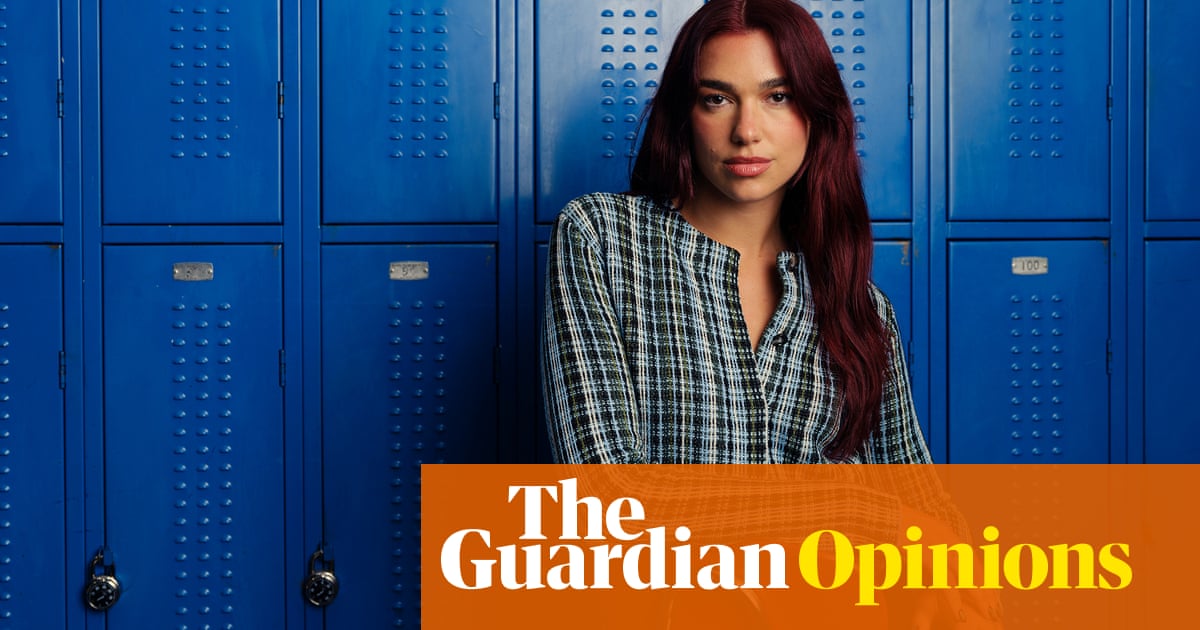Dua Lipa is, obviously, good at a lot of things. She sings, she dances, she writesdozens of songs, and she co-designed a collection with Donatella Versace. But if someone told you that she’d recently come out on top in a Mortal Kombat-style contest as the best literary interviewer, you’d probably think they’d taken her song Hallucinate a bit too literally.
Nevertheless, that’s what’s happened, ina YouTube videothat has garnered more than a million views in a matter of weeks. And the case it makes is … surprisingly convincing. “I was researching a video essay about the quality of literary interviews in different venues,” says writer Blake Lefray, who put the video together for his fledgling channel. He came across Lipa’s interview with Hernan Diaz, author of the Pulitzer prize-winning Trust, and was “pretty blown away”.
Though he had seen Diaz interviewed several times by journalists and TV hosts, Lipa’s interview was “easily the best”, he says. “At first, I thought crowningDua Lipathe best current interviewer of novelists would be a ridiculous bit of clickbait – but the more I watched her interviews, the more I realised that, for me personally, she’s the best one doing it right now. She asks smart questions dipped in empathy and curiosity.”
Thissoundslike hyperbole, but after you watch a couple of interviews, it’s quickly noticeable that something feels different from the usual round of PR-prepared soundbites. In the Diaz interview, Lipa asks if one of his characters is based on an investigative journalist whose exposé of John D Rockefeller helped to break up the Standard Oil Trust – and Diaz, who’s never heard of the journalist before, seems astonished. A chat with Nobel laureate Olga Tokarczuk includes a lengthy digression on the importance of William Blake as an anti-establishment figure in communist Poland. A conversation with Lincoln in the Bardo author George Saunders segues into a discussion about the importance of being non-judgmental during first drafts, and includes a (slightly star-struck) Saunders asking Lipa how it felt to perform at Glastonbury.
Sign up toBookmarks
Discover new books and learn more about your favourite authors with our expert reviews, interviews and news stories. Literary delights delivered direct to you
after newsletter promotion
All of this isn’t exactly standard for broadcasted author interviews. On late-night shows, questions are typically fluff – Jimmy Fallon’s first question is usually some variation on “How does it feel to have written such a bestselling book?”, while Seth Meyers spent a chunk of his own interview with Diazasking about the penhe uses to write longhand. Lorraine Kelly and Angela Rippon are a bit better at probing questions, but their segments are so short that there’s barely time to hit more than the key points, let alone get into a meandering discussion about destiny, empathy ormarriage equalityunder rightwing governments. Podcasts and book festivals are, of course, much better – and possibly a fairer comparison, but as Lefray notes, they are a lot less consistent than Lipa: occasionally awkward, sometimes excruciating, and far too fond of using the qualifier “sort of”.
So how is she doing it? Firstly, Lipa seems to read a lot: in a keynote speech on the power of reading at the 2022 Booker prize, she mentions learning about the Albanian spirit of resistance through the work of author Ismail Kadare as a teenager. Her interviews are part of the book club she runs through her lifestyle website Service95, and while a cynic might suggest they’re a way to build a personal brand while pocketing a bit of affiliate-link cash (Reese Witherspoon, Dakota Fanning, Natalie Portman and Fallon himself are just a few of the celebrities to have their own clubs along with, of course, Oprah), she started herfirstbook club with some close friends back in 2019.
She was posting recommendations on Instagram long before Service95, and her own bookshelf, tantalisingly visible in most of her interviews, is stuffed with an impressively esoteric mix of books, from Katy Hessel’s The Story of Art Without Men to Joe Coscarelli’s Rap Capital. Maybe, as someone who’s given hundreds of interviews in her time, she also understands what makes a good interview: the questions artists love and hate, the sorts of things they wish they were asked, and the things that make them open up. It’s unclear if she alone writes the questions – her reps didn’t respond to a request for comment – but she clearly knows the material: she’s always familiar with side characters and subplots, and never seems caught off guard by an unplanned author aside.
Beyond all of that, perhaps Dua Lipa is a good interviewer because she reads the books the way authors hope they’ll be read: diving into their characters and worlds for the sheer joy of the experience. It’s obvious she reads thoughtfully and deeply, bringing her to an understanding of each work that naturally leads her to want to know more. Listen to enough of her interviews, and her enthusiasm is so infectious that it’s difficultnotto want to read more, or read more broadly, or just readbetter. All of that, and she also wrote Houdini. Time to step it up, Fallon.
